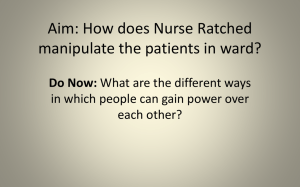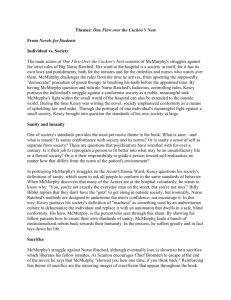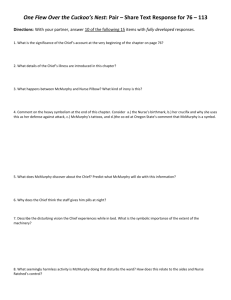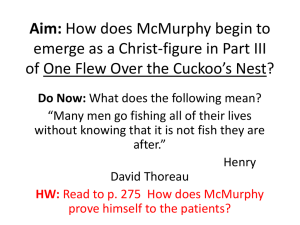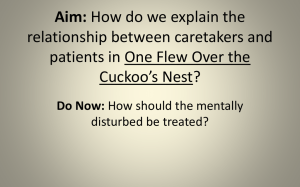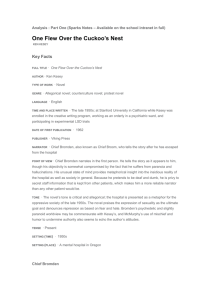quote-cards3
advertisement
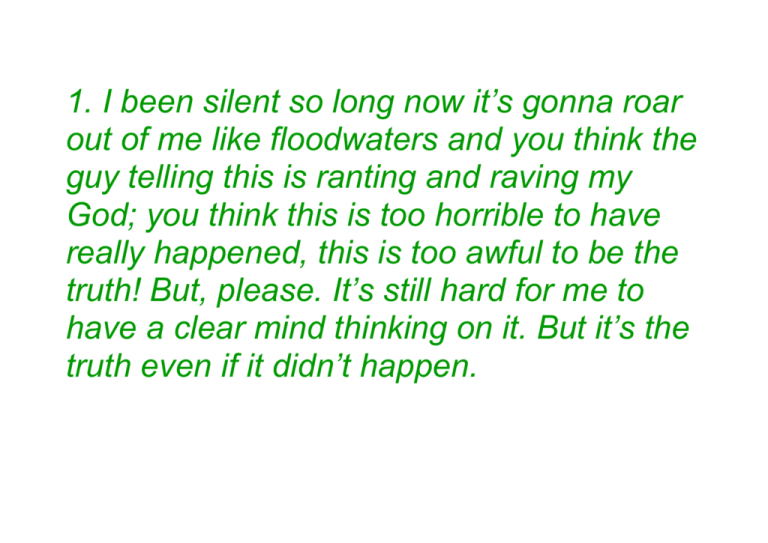
1. I been silent so long now it’s gonna roar out of me like floodwaters and you think the guy telling this is ranting and raving my God; you think this is too horrible to have really happened, this is too awful to be the truth! But, please. It’s still hard for me to have a clear mind thinking on it. But it’s the truth even if it didn’t happen. We are given this brainteaser from Chief Bromden in Part I. The reader has already gotten a glimpse of Bromden’s paranoia, from the novel’s opening lines, as well as a sense that he is not seeing things from an everyday perspective. For example, Bromden describes Nurse Ratched transforming into a huge machine, and he has to be sedated when the aides try to shave him and he starts screaming “Air Raid.” Up until this point he has not addressed the reader directly; it is as though we are overhearing his private thoughts. But in this passage he asserts himself as not only the narrator but the author of the story. We learn here that he has an important story to tell, even though it is going to be difficult. The ugly and violent images that he has already shown us, he warns us, are just a taste of what is to come. The last line of the quote is Bromden’s request that the reader keep an open mind. His hallucinations provide metaphorical insight into the hidden realities of the hospital and should not be overlooked simply because they did not actually happen. Although over the course of the novel Bromden regains his sanity, he still witnesses many of the events while in a semi-catatonic, hallucinatory state; we have to trust in the truth of his sharp perceptions, no matter what form they take. 2. The flock gets sight of a spot of blood on some chicken and they all go to peckin’ at it, see, till they rip the chicken to shreds, blood and bones and feathers. But usually a couple of the flock gets spotted in the fracas, then it’s their turn. And a few more gets spots and gets pecked to death, and more and more. Oh, a peckin’ party can wipe out the whole flock in a matter of a few hours, buddy, I seen it. A mighty awesome sight. The only way to prevent it - with chickens - is to clip blinders on them. So’s they can’t see. In this session of group therapy, McMurphy accuses the men of betraying him by not telling him how much he was risking with his rebellious behaviour. What started as a prank has taken a dire turn. This quote is the only time McMurphy comes close to expressing regret for his choices and actions. It is a moment of pause and reflection in the film as both we as viewers and McMurphy assess whether he can afford to continue his opposition to Nurse Ratched’s repression. These lines introduce the concept of betrayal and the fact that McMurphy clearly is saddened by the men’s failure to provide him with critical information about the hospital’s policies, particularly Nurse Ratched’s ability to decide the length of McMurphy’s stay. The film suggests that for McMurphy and for humanity, ignorance has devastating consequences. It further suggests that, as interconnected human beings, we have responsibilities to protect one another. With this line, McMurphy publicly acknowledges that he has pitted himself in opposition to Nurse Ratched and admits that he has gone too far to change the outcome. His friends have failed to warn him, and he has lost his physical freedom to Nurse Ratched. An unstated question seems to hang in the air, heightening the tension of the scene. Might there yet be more for him to lose if he continues to fight her? As the scene unfolds, McMurphy must decide whether or not to escalate their conflict despite the magnitude of the risks. 3. So you see my friend, it is somewhat as you stated: man has but one truly effective weapon against the juggernaut of modern matriarchy, but it certainly is not laughter. One weapon, and with every passing year in this hip, motivationally researched society, more and more people are discovering how to render that weapon useless and conquer those who have hitherto been conquerors. . . . This passage occurs later in the same discussion that followed McMurphy’s first Group Meeting in Part I. Here, Kesey begins to develop his misogynistic theory about modern society. Harding is talking to McMurphy, explaining that men’s one weapon against women is the penis, and that if men are unable to use rape effectively, they have no chance to regain power in society. Kesey believes that women have learned this, and they now know how to render men’s one weapon useless - in other words, they are all ball-cutters. Where rape is the male means to power, castration is the female way to domination. These crude ideas are given substance throughout the novel. Kesey uses McMurphy’s fearless sexuality as a sign that he is sane. McMurphy goads Ratched sexually by wearing just a towel, pinching her rear, remarking on her breasts, and eventually tearing her shirt open. Most of the male patients have stories about damaging relationships with women, such as Bromden’s mother, Billy Bibbit’s mother and onetime girlfriend, and Harding’s wife. When McMurphy notices Bromden’s erection, a sign that he is “getting bigger already,” it signifies that Bromden is becoming more powerful and saner. Similarly, through sex with Candy, Billy briefly regains his confidence and his manhood, until Ratched takes it away and he commits suicide. Moreover, Ratched and the hospital supervisor, also a woman, wield all the power in the hospital: “We are victims of a matriarchy here,” says Harding. 4. Except the sun, on these three strangers, is all of a sudden way the hell brighter than usual and I can see the . . . seams where they’re put together. And, almost, see the apparatus inside them take the words I just said and try to fit the words in here and there, this place and that, and when they find the words don’t have any place ready-made where they’ll fit, the machinery disposes of the words like they weren’t even spoken. In this passage from the beginning of Part III, Bromden, who has been gaining selfawareness since McMurphy’s arrival on the ward, remembers a scarring experience he had as a ten-year-old. Three government officials came to speak to his father, Chief Tee Ah Millatoona, about buying the tribe’s land to build a hydroelectric dam. When Bromden tried to speak to them, he noticed that “[n]ot a one of the three acts like they heard a thing [he] said.” He begins to see the world differently, believing that he can see the seams on people, as though they were inhuman or machine-like. For Kesey, the drones who do the dirty work of an oppressive society are basically machines. The government officials who visited Bromden’s father were planning to make a profit by destroying nature, represented by the tribe’s ancient connection to the land, the river, and the fish, and replacing it with destructive technology. The brightness of the sun sheds light on the dark fact these officials taught Bromden: that people who do not have “any place ready-made where they’ll fit” are ignored and disposed of. At first the “machinery” disposes of Bromden’s words; then, over time, it seems to ignore his entire being. 5. While McMurphy laughs. Rocking farther and farther backward against the cabin top, spreading his laugh out across the water - laughing at the girl, the guys, at George, at me sucking my bleeding thumb, at the captain back at the pier and the bicycle rider and the service-station guys and the five thousand houses and the Big Nurse and all of it. Because he knows you have to laugh at the things that hurt you just to keep yourself in balance, just to keep the world from running you plumb crazy. While on the fishing expedition, the patients are able to laugh freely and feel like whole humans again. As usual, this happens with McMurphy's guidance - he is an example for all the patients to follow. Here, Bromden shows how McMurphy's booming laughter in the face of chaos, which could be seen as the mark of a psychopath, is the one thing that keeps McMurphy sane. Bromden implies that it is the pressures of society - the captain, the five thousand houses, the Big Nurse, “the things that hurt you” - that drive people insane. To maintain sanity in such an oppressive and cruel world, people cannot allow these external forces to exert too much power. When a person succumbs to seeing and experiencing all the sadness and suffering of humanity, as Bromden has done for ten years, it naturally makes him or her unable, or unwilling, to cope with reality - in other words, it can make that person “plumb crazy.”

